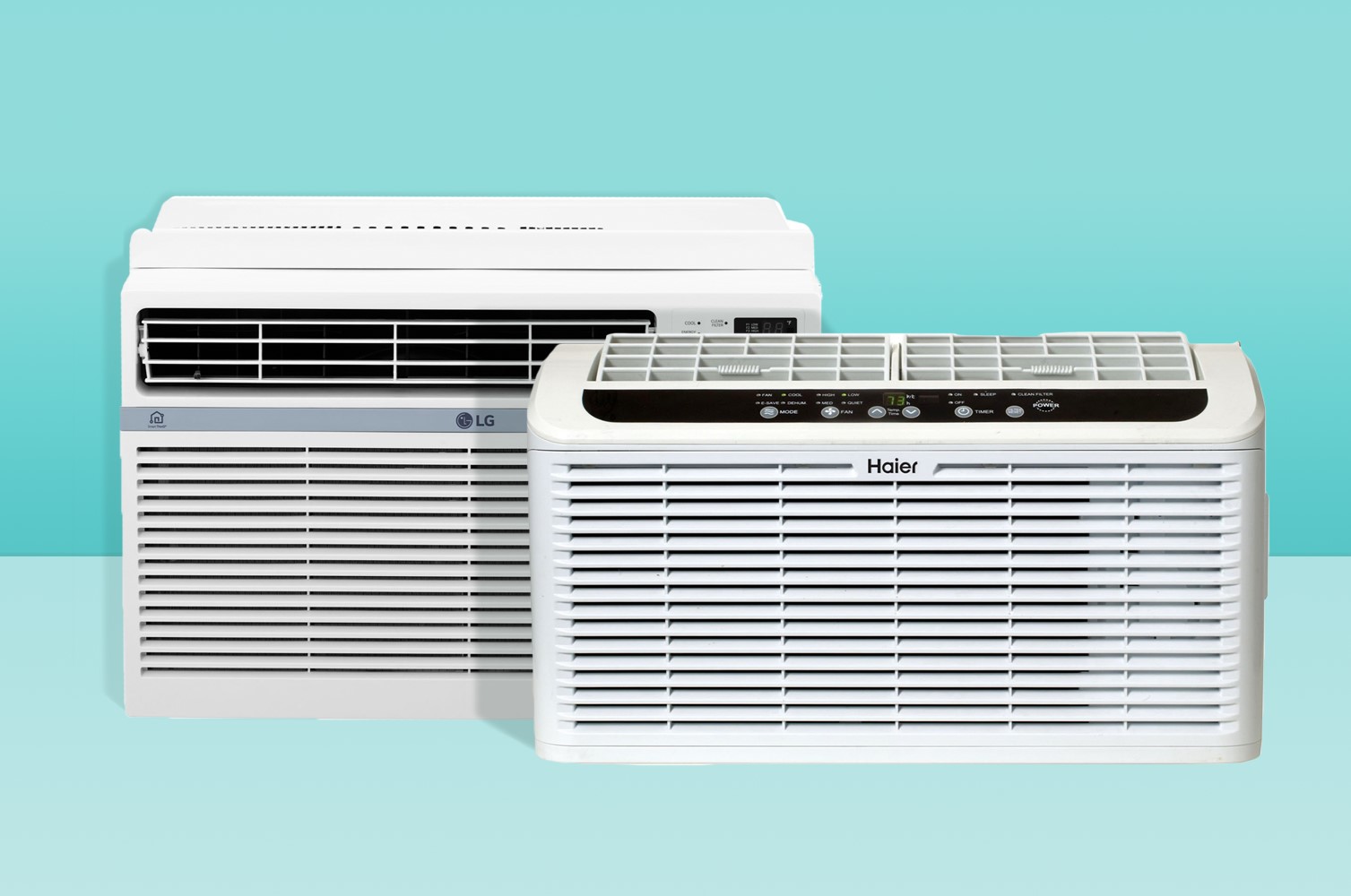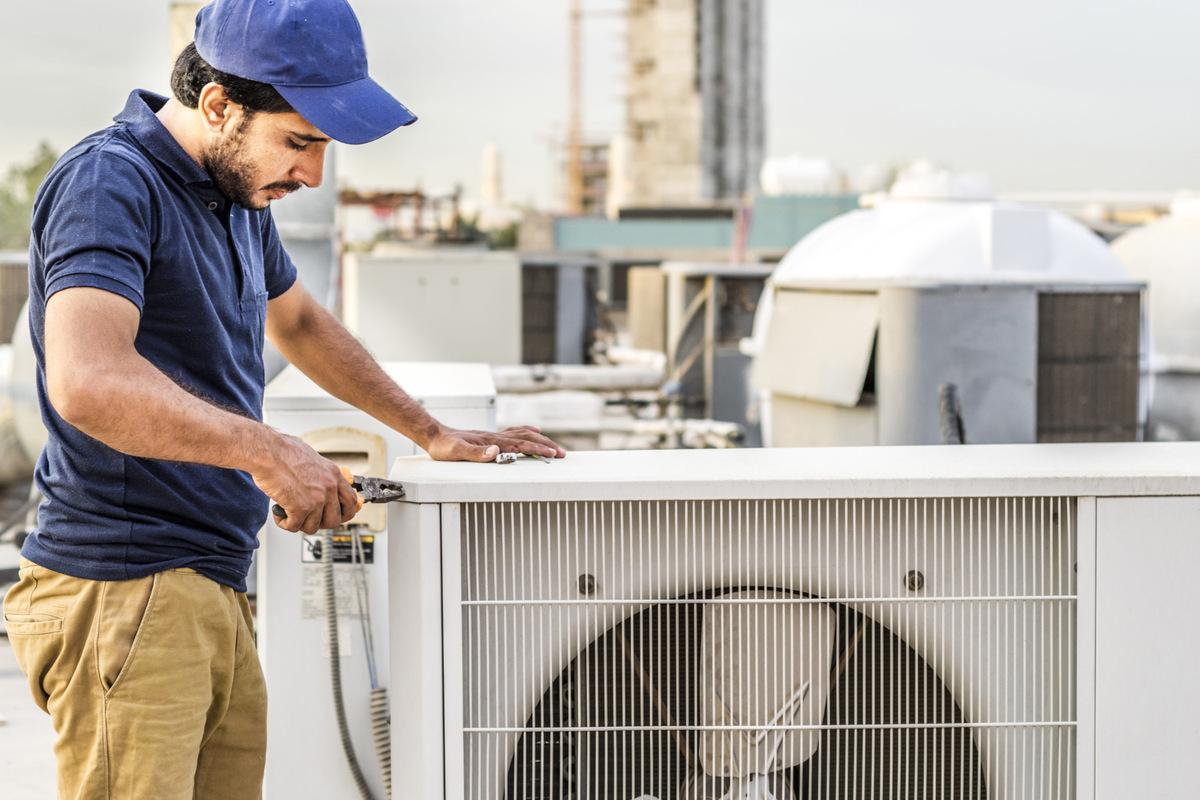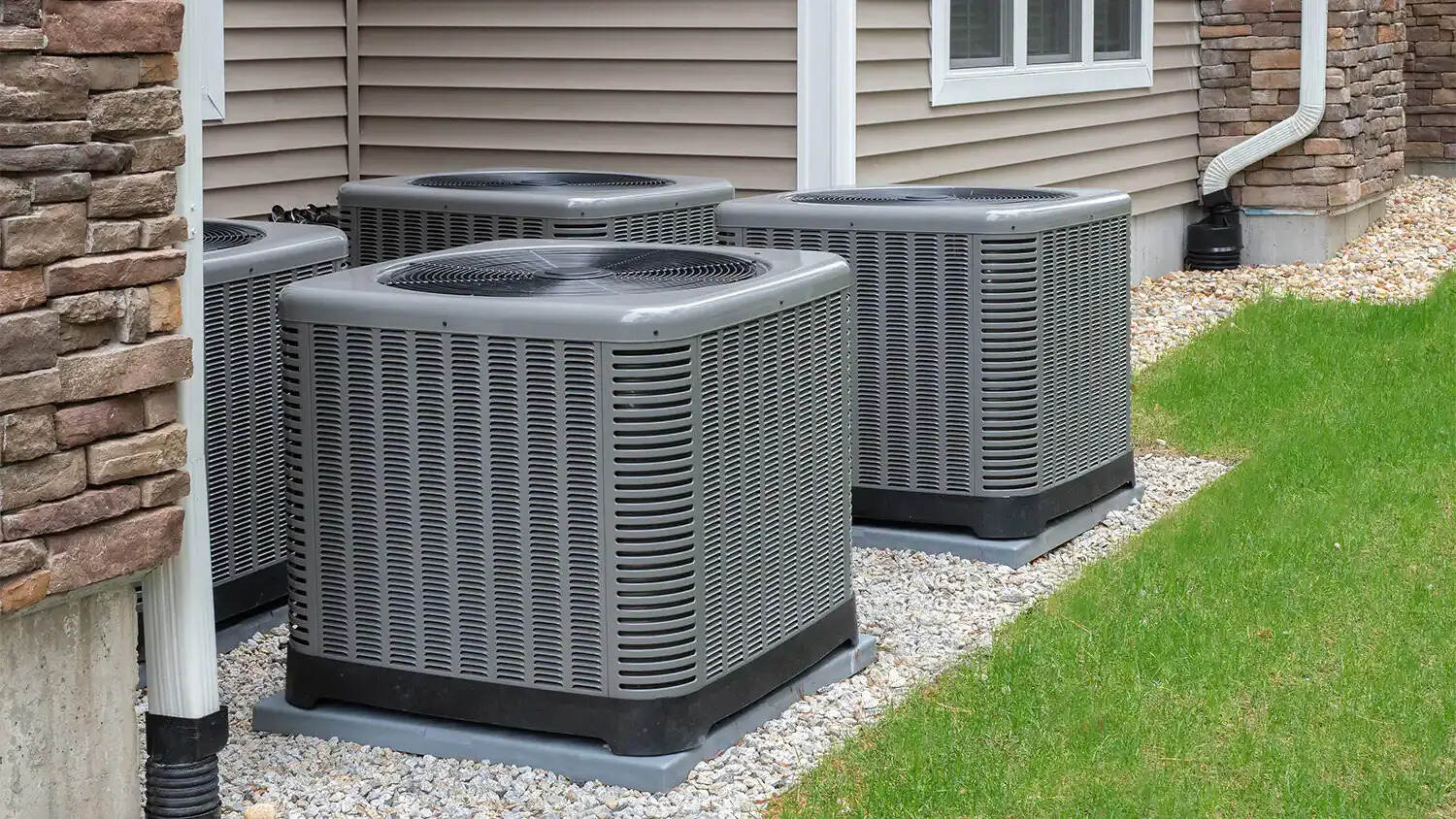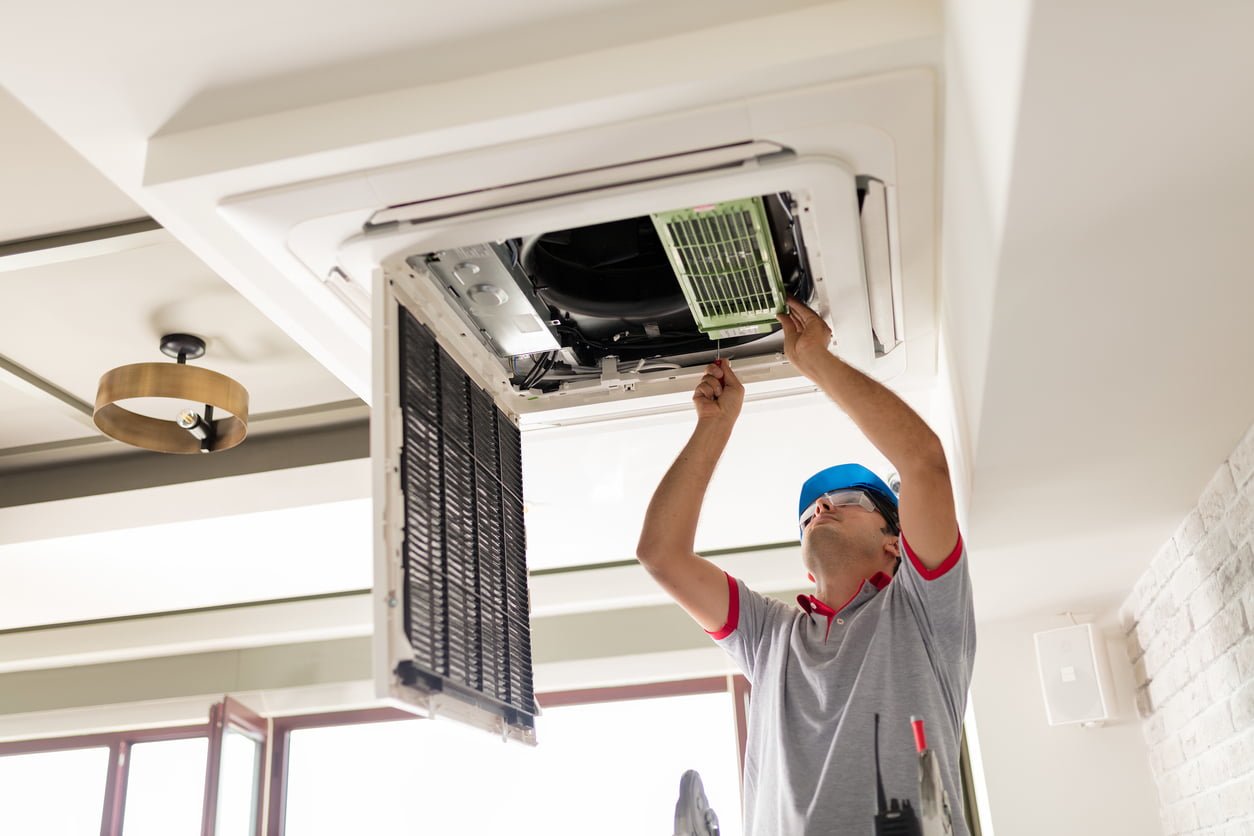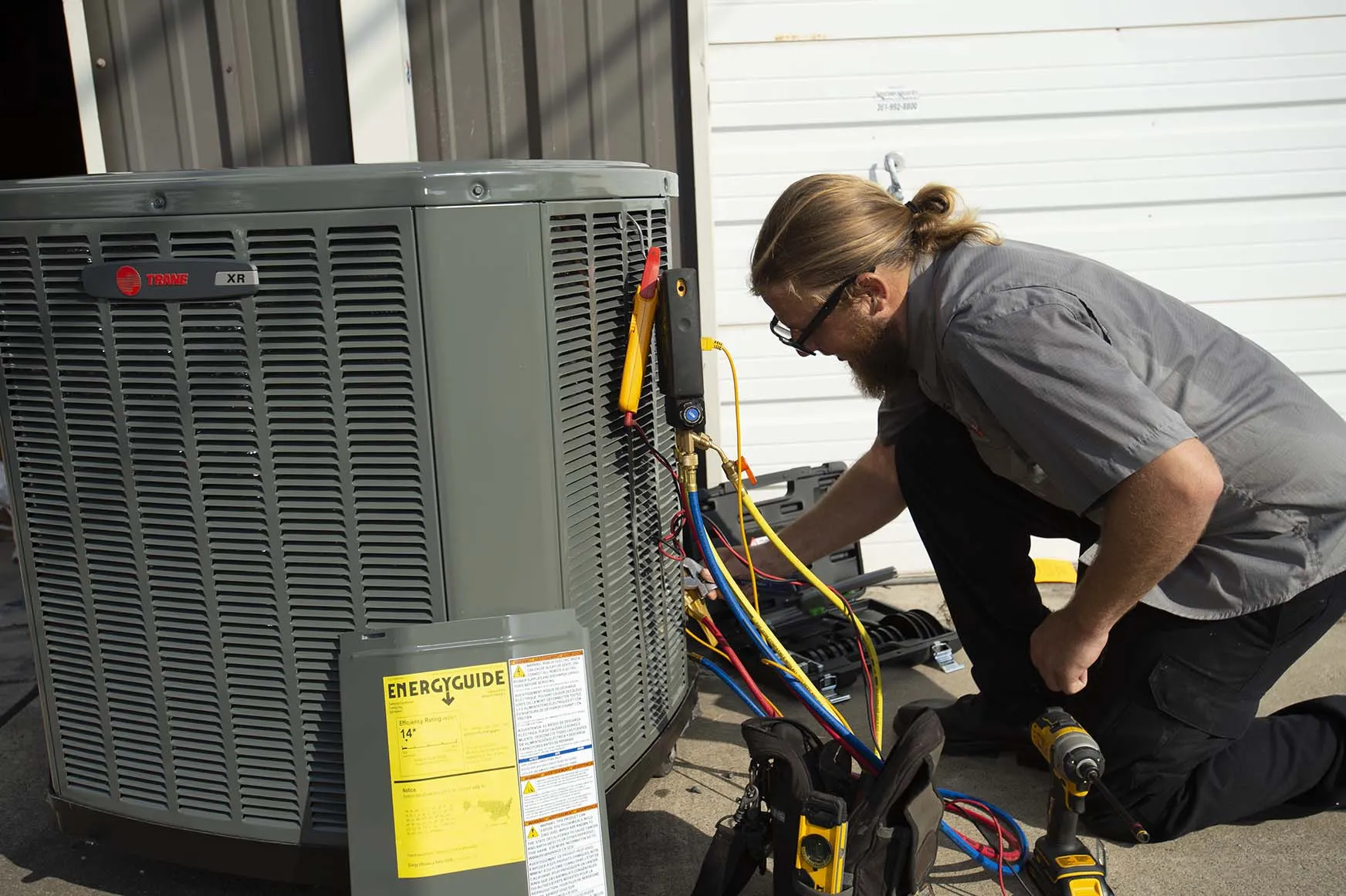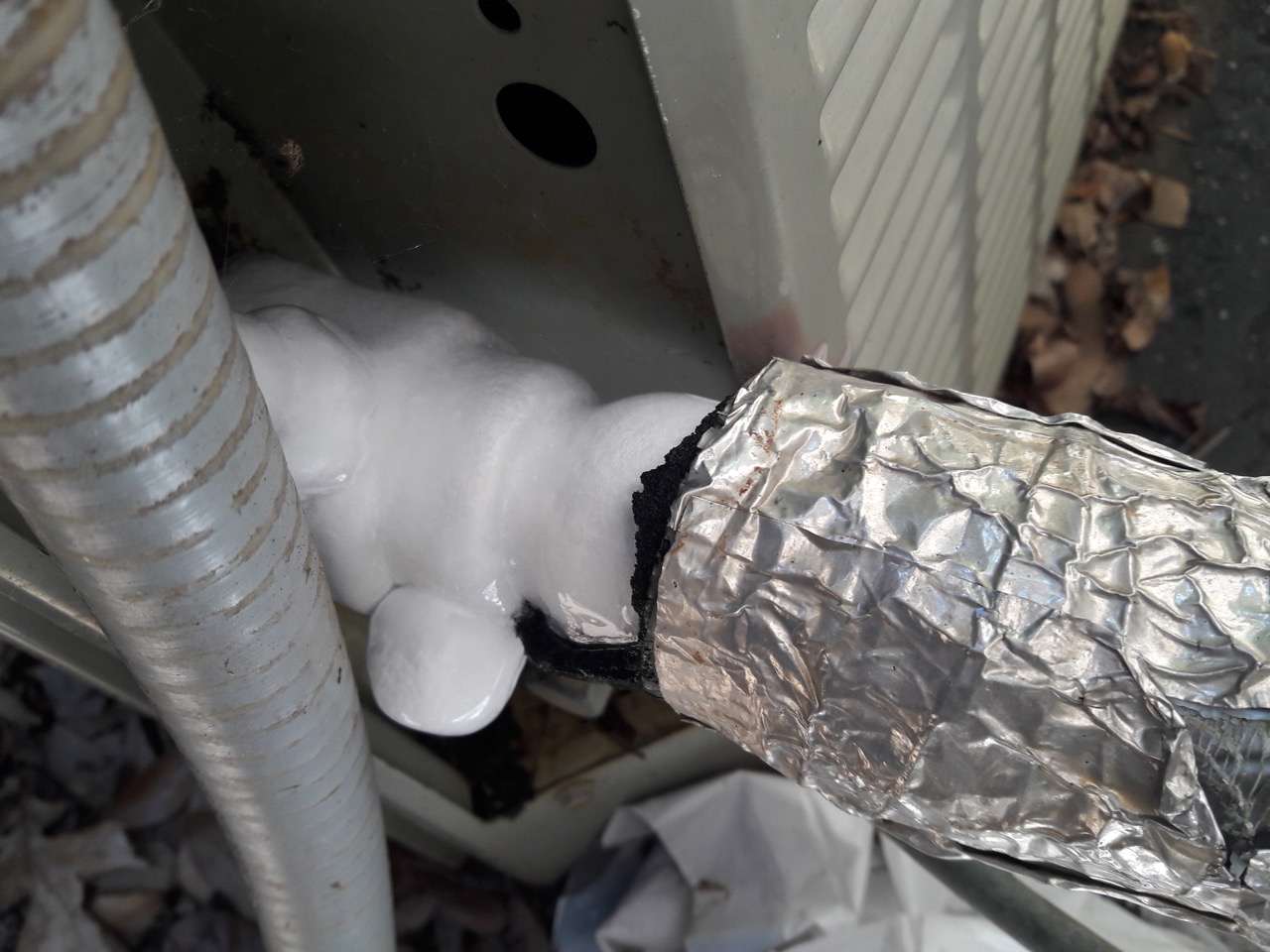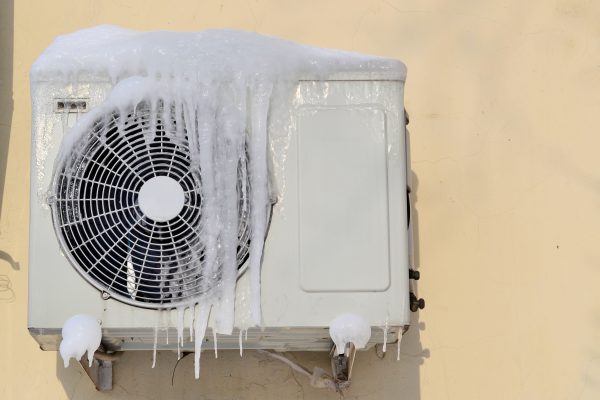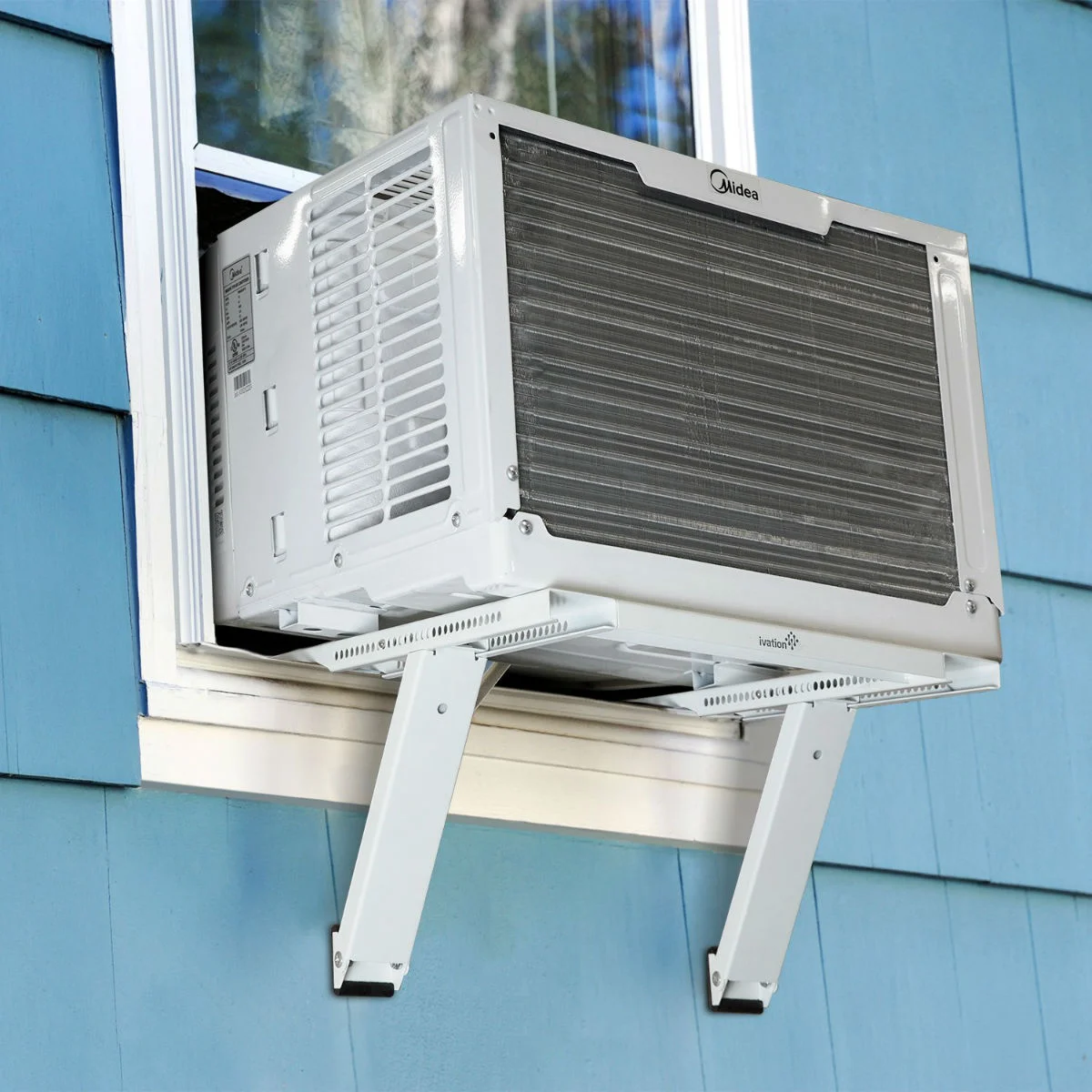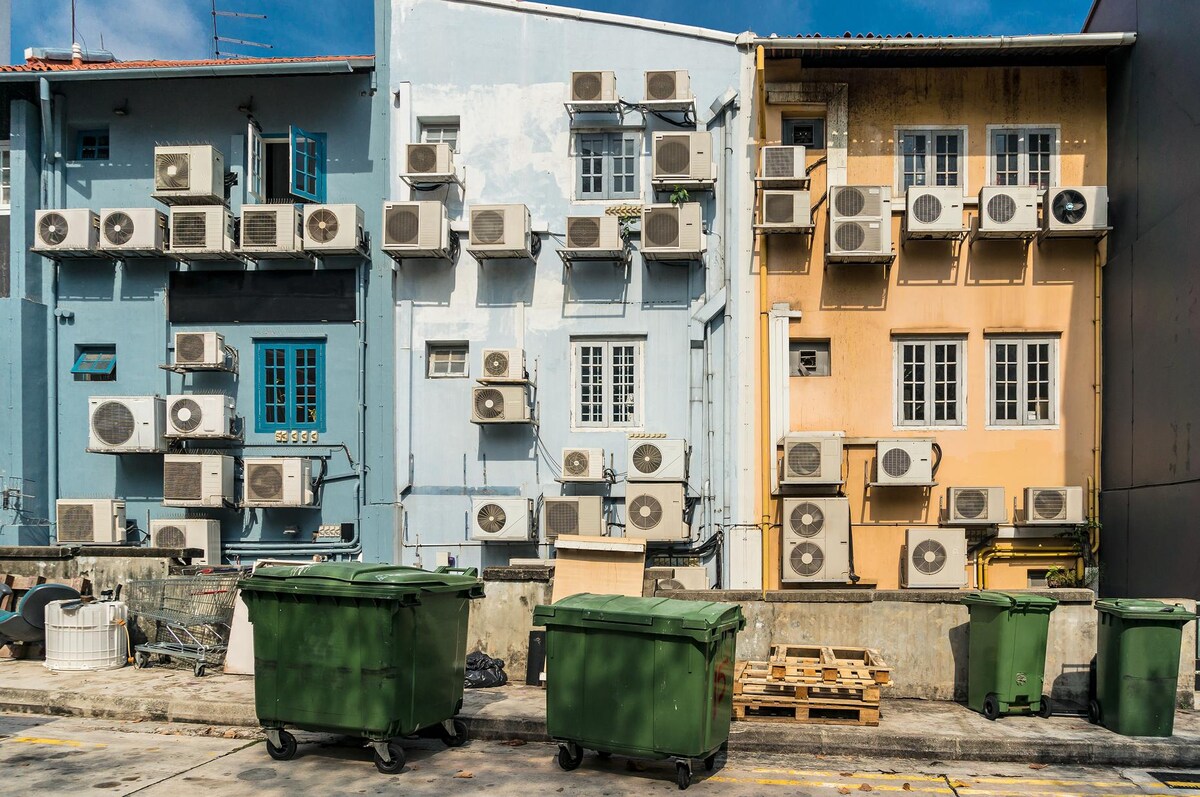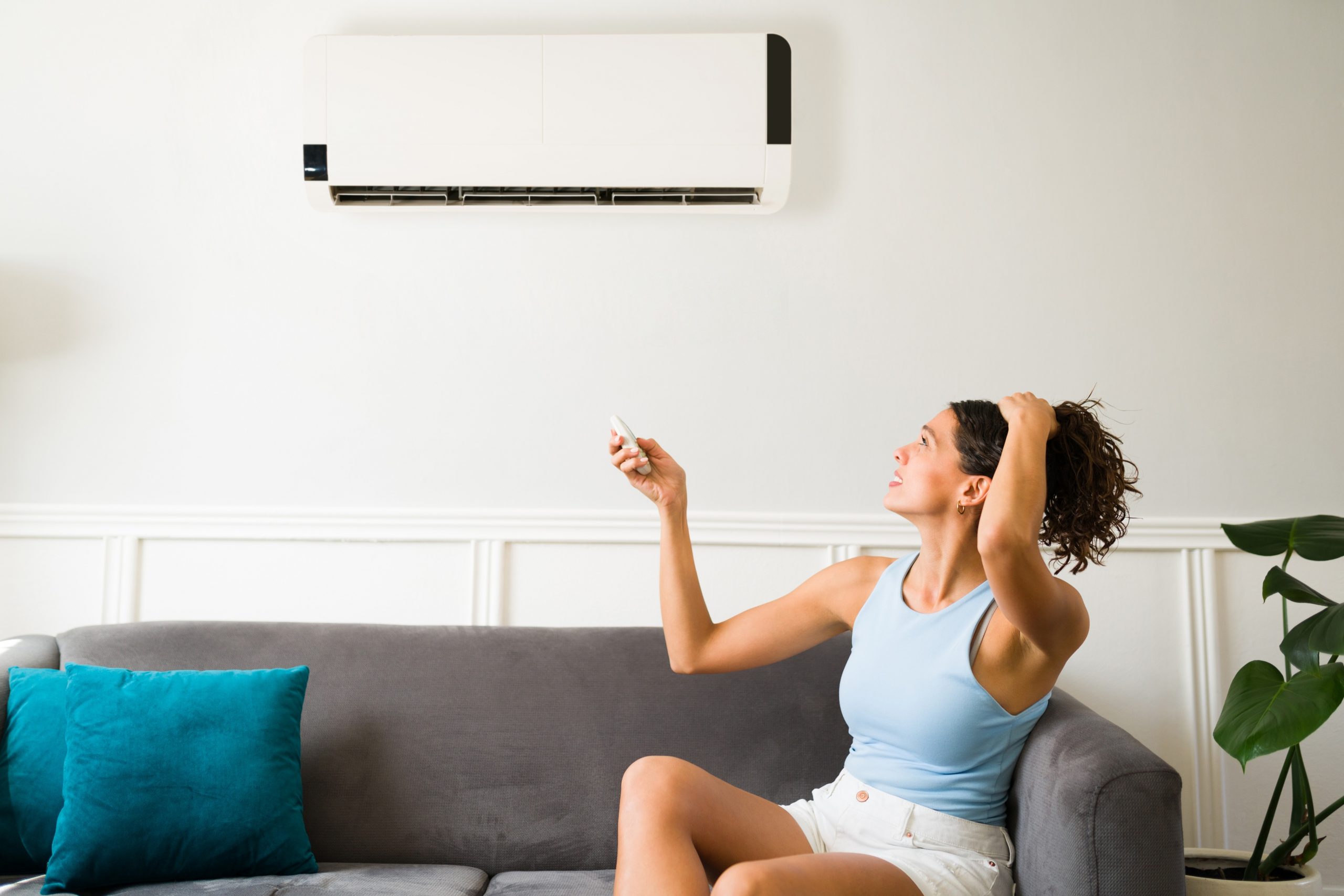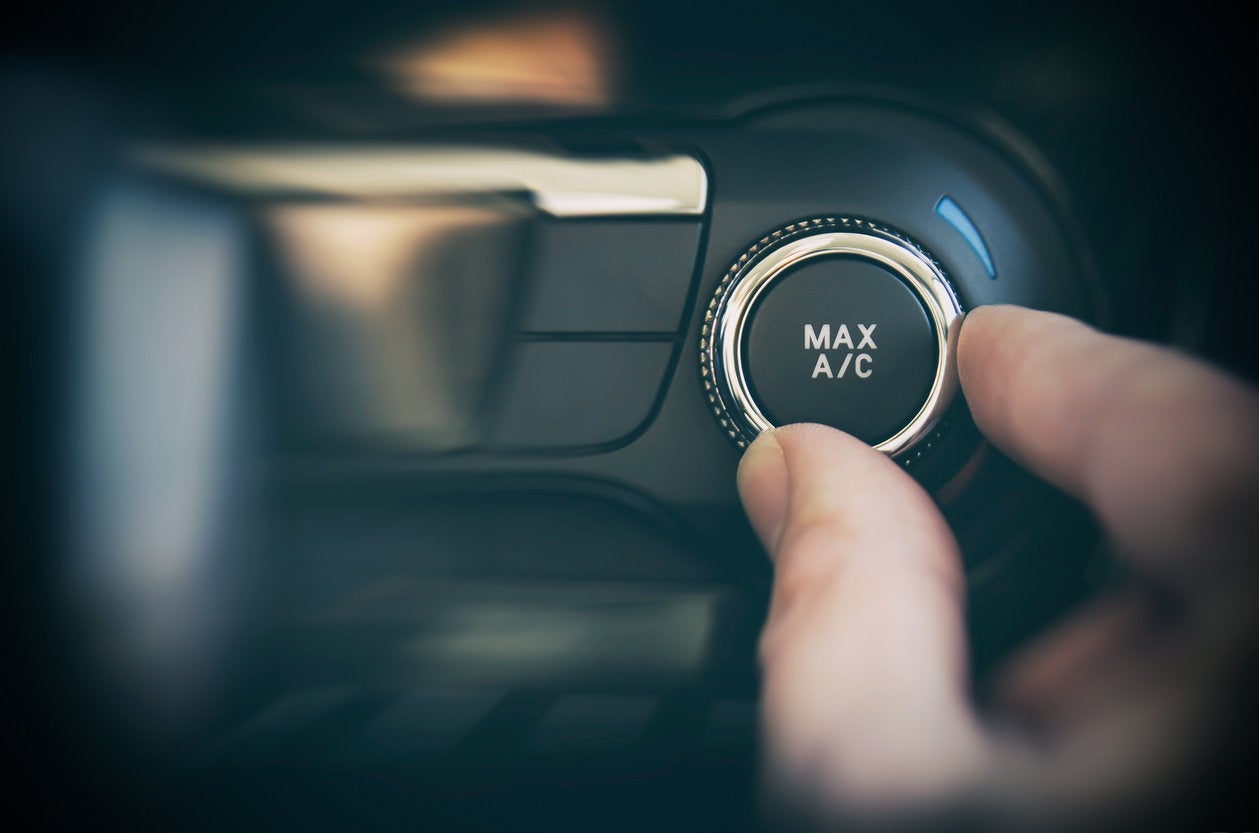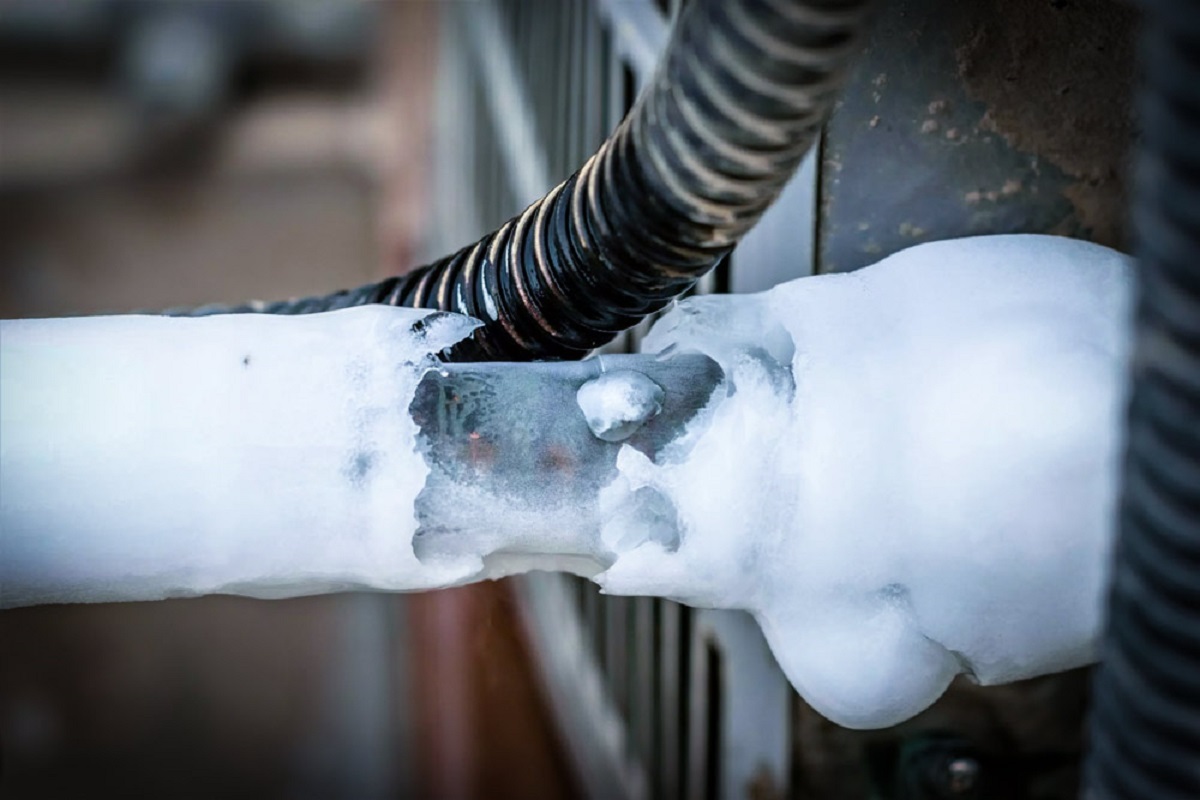Home>Home Maintenance>Why Air Conditioning Unit Freezes Up
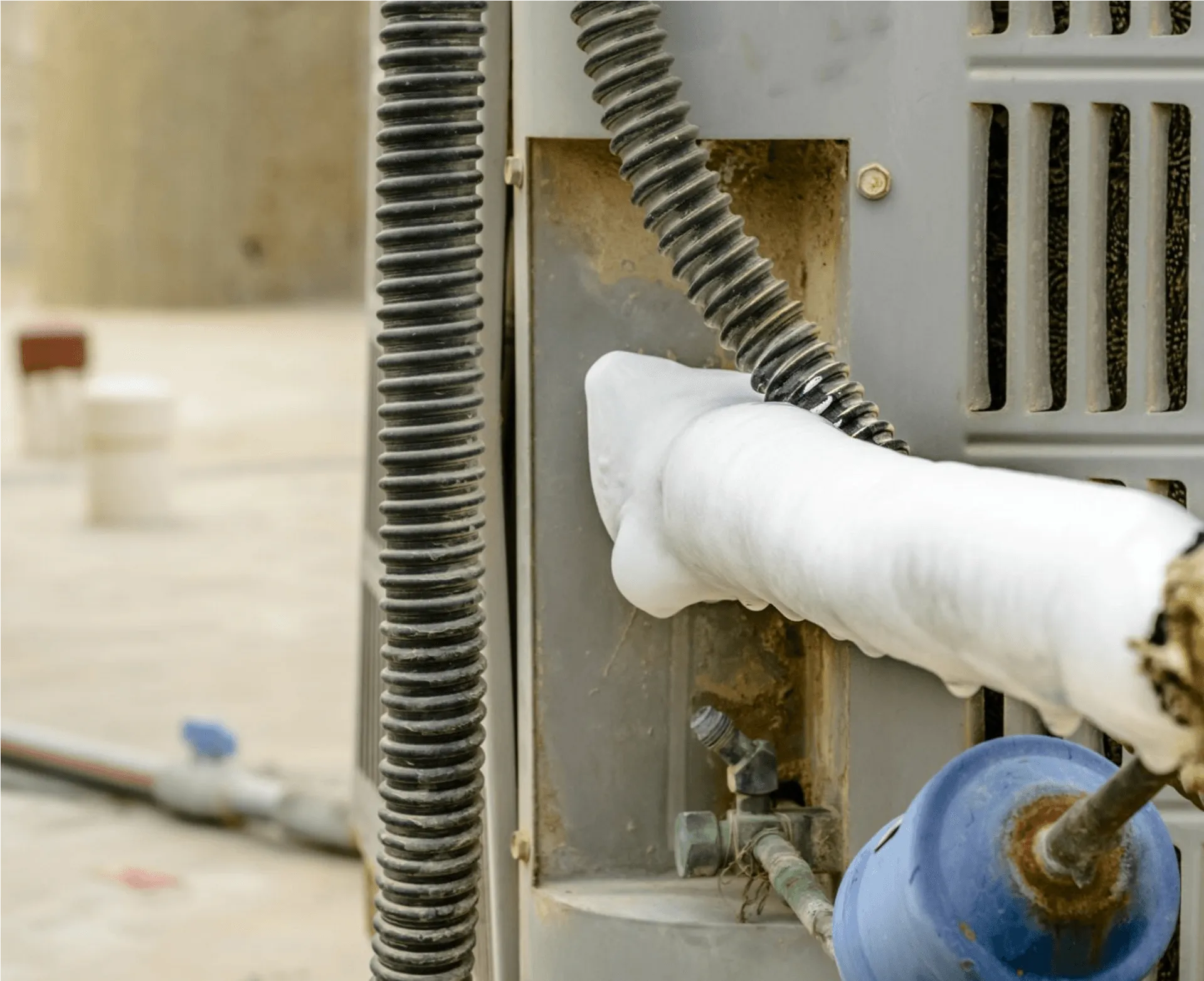

Home Maintenance
Why Air Conditioning Unit Freezes Up
Modified: March 6, 2024
Prevent your air conditioning unit from freezing up with these home maintenance tips. Keep your home cool and comfortable all summer long.
(Many of the links in this article redirect to a specific reviewed product. Your purchase of these products through affiliate links helps to generate commission for Storables.com, at no extra cost. Learn more)
Introduction
Welcome to our comprehensive guide on why air conditioning units freeze up. Few things are more frustrating than a frozen AC unit, especially during the hot summer months when you rely on it the most. Not only can a frozen AC unit prevent your home from reaching the desired temperature, but it can also lead to potential damage and costly repairs.
In this article, we will explore the common causes of AC units freezing up and provide you with insights on how to prevent and troubleshoot this issue. By understanding the root causes and taking proactive measures, you can keep your air conditioning unit running smoothly and efficiently.
Before diving into the causes, it’s important to understand the underlying science behind AC unit freezing. Air conditioning units work by absorbing heat from the indoor air, cooling it, and then releasing it back into the space. During this process, condensation forms on the evaporator coil, which is normal. However, if the system is not functioning properly, the condensation can freeze, leading to a variety of problems.
Now, let’s examine the common causes of AC units freezing up and how to address them to ensure your AC unit operates optimally.
Key Takeaways:
- Keep your air conditioning unit from freezing up by regularly cleaning or replacing air filters, ensuring open and unobstructed vents, and maintaining proper thermostat function. These simple steps can prevent frustrating cooling issues.
- Prevent freezing of your air conditioning unit by scheduling regular professional maintenance, addressing issues with the evaporator and condenser coils, and maintaining proper refrigerant levels. Proactive care ensures efficient cooling and comfort.
Read more: Why Does an AC Unit Freeze Up
Common Causes of Freezing Up
There are several factors that can contribute to an air conditioning unit freezing up. Understanding these causes will help you diagnose and address the issue effectively. Here are the most common culprits:
- Insufficient airflow: Restricted airflow is one of the primary causes of AC unit freezing. When the airflow is limited, the cold air cannot circulate properly, causing the temperature to drop below freezing point. This can be due to a clogged air filter, closed or blocked vents, or issues with the fan motor.
- Dirty air filters: A dirty or clogged air filter can not only reduce the airflow but also restrict the proper exchange of warm and cold air. As a result, the evaporator coil gets too cold and freezes. Regularly cleaning or replacing the air filter is crucial to maintain proper airflow and prevent freezing.
- Low refrigerant levels: Refrigerant is responsible for absorbing heat from the indoor air and releasing it outside. When the refrigerant levels are low, the system is unable to remove an adequate amount of heat, causing the evaporator coil to become too cold and freeze. Low refrigerant levels usually indicate a leak in the system, which should be addressed by a professional HVAC technician.
- Malfunctioning thermostat: A faulty thermostat can lead to inconsistent temperature control, causing the AC unit to cycle on and off frequently. This can result in an icy build-up on the evaporator coil. Ensure that your thermostat is calibrated correctly and functioning properly to avoid freezing issues.
- Blocked or restricted air vents: Obstructed air vents can impede the proper airflow throughout your home, leading to freezing of the AC unit. Make sure that all air vents are open and unobstructed by furniture, curtains, or other objects that may block the airflow.
- Problems with the evaporator coil: Issues with the evaporator coil, such as dirt or debris buildup, can disrupt heat absorption and prevent proper heat exchange. This can cause the coil to freeze. Regular maintenance, such as cleaning the coil, can help prevent freezing due to coil-related problems.
- Issues with the condenser coil: Similar to the evaporator coil, the condenser coil plays a critical role in releasing heat outside. If the condenser coil is dirty or damaged, it can impede heat dissipation and lead to freezing of the AC unit. Routine maintenance, including cleaning the condenser coil, is essential to prevent freezing caused by condenser coil issues.
- Inadequate maintenance: Lack of regular maintenance and inspections can contribute to a variety of AC problems, including freezing. Neglecting tasks such as cleaning, lubricating moving parts, and checking refrigerant levels can lead to reduced system efficiency and freezing issues. It is important to schedule professional HVAC maintenance at least once a year to prevent potential freezing and other system malfunctions.
By addressing these common causes, you can prevent your air conditioning unit from freezing up and ensure that it operates efficiently, keeping you cool and comfortable all summer long. In the following sections, we will delve deeper into each cause and provide you with actionable tips on how to troubleshoot and resolve the issues.
Insufficient Airflow
Insufficient airflow is one of the primary culprits behind a freezing air conditioning unit. When the airflow is restricted, the cold air cannot circulate properly, causing the temperature to drop below freezing point. This leads to the formation of ice on the evaporator coil and can result in reduced cooling capacity and potential damage to the unit.
There are several reasons why airflow may be restricted:
- Clogged air filter: A dirty or clogged air filter can obstruct the airflow, preventing the cold air from reaching the evaporator coil. When the coil doesn’t receive enough warm air to absorb, it can become too cold and freeze up. Regularly cleaning or replacing your air filter is essential to maintain proper airflow and prevent freezing issues. It is recommended to clean or replace the filter every 1-3 months, depending on usage and the type of filter used.
- Closed or blocked vents: Closed or obstructed air vents can severely inhibit the airflow in your home, leading to the freezing of your air conditioning unit. Ensure that all vents are open and free from any obstructions, such as furniture or drapes. This will allow the cold air to circulate freely, preventing the evaporator coil from getting too cold and freezing.
- Fan motor issues: Problems with the fan motor can also contribute to insufficient airflow. If the fan is not running at the proper speed or not working at all, it can hinder the distribution of cool air throughout your home. This can result in the evaporator coil becoming excessively cold and freezing. If you suspect issues with the fan motor, it is best to consult a professional HVAC technician for inspection and repair.
To prevent insufficient airflow and subsequent freezing of your air conditioning unit, follow these tips:
- Regularly clean or replace your air filter to ensure proper airflow. This will not only prevent freezing but also improve indoor air quality and increase the efficiency of your AC unit.
- Keep all vents open and unobstructed to allow free airflow. Avoid placing furniture or curtains in front of vents that could restrict the circulation of cool air.
- Regularly inspect the fan motor for any signs of malfunction. If you notice any unusual noises or issues with the fan’s operation, contact a professional HVAC technician for assistance.
By addressing and resolving insufficient airflow issues, you can prevent your air conditioning unit from freezing up and ensure that it operates optimally, providing efficient cooling throughout your home.
Dirty Air Filters
Dirty air filters are a common cause of air conditioning units freezing up. When the air filter becomes dirty or clogged, it restricts the airflow, preventing the proper exchange of warm and cold air. As a result, the evaporator coil gets too cold, causes condensation to freeze and hinder the unit’s performance.
Here’s why dirty air filters contribute to freezing:
- Reduced airflow: When the air filter is dirty, it restricts the flow of air through the unit. This reduced airflow prevents the warm air from reaching the evaporator coil, causing it to become excessively cold and freeze up. Restricted airflow also decreases the efficiency of the AC unit, making it work harder to cool your home.
- Inadequate heat exchange: The proper exchange of warm and cold air is crucial for maintaining a balanced temperature in your home. A dirty air filter hampers this process by obstructing the flow of air over the evaporator coil. As a result, the coil doesn’t receive enough warmth to absorb, leading to the development of ice on the coil and freezing of the unit.
- Increased energy consumption: When the air filter is dirty, the AC unit has to work harder to push the air through the clogged filter. This extra effort increases energy consumption, leading to higher utility bills. Additionally, the strain on the system can lead to premature wear and tear on the components of the AC unit.
To prevent freezing caused by dirty air filters, it’s essential to maintain a regular cleaning and replacement schedule:
- Cleaning: If you have a reusable air filter, follow the manufacturer’s instructions to clean it regularly. Typically, this requires rinsing the filter with water and allowing it to dry completely before reinstalling it. Cleaning should be done at least once a month or more often if you have pets or live in a dusty environment.
- Replacement: If you have a disposable air filter, check it monthly and replace it when it becomes dirty or clogged. The frequency of replacement depends on the type of filter and usage but is typically recommended every 1-3 months. Consider using high-quality filters with a higher MERV (Minimum Efficiency Reporting Value) rating to capture more particles and maintain better air quality.
In addition to regular cleaning and replacement, it’s important to practice good indoor air quality habits to reduce the accumulation of dust and debris in your home. This includes keeping doors and windows closed, vacuuming regularly, and minimizing the use of products that generate airborne particles.
By regularly cleaning or replacing your air filters and maintaining good indoor air quality practices, you can prevent freezing caused by dirty air filters. This ensures that your air conditioning unit operates efficiently, provides optimal cooling, and prolongs its lifespan.
Low Refrigerant Levels
Low refrigerant levels are a common cause of air conditioning units freezing up. Refrigerant is the substance responsible for absorbing heat from the indoor air and releasing it outside. When the refrigerant levels are insufficient, the system is unable to remove heat efficiently, causing the evaporator coil to become excessively cold and freeze.
Here’s why low refrigerant levels contribute to freezing:
- Inadequate heat absorption: The purpose of refrigerant is to absorb heat from the indoor air as it passes over the evaporator coil. With low refrigerant levels, the system cannot absorb enough heat, resulting in the coil becoming too cold. This can lead to the formation of ice on the coil and subsequent freezing of the unit.
- Imbalanced pressure: Refrigerant operates in a closed-loop system where it cycles between the evaporator coil and condenser coil. It undergoes a phase change from gas to liquid and vice versa to facilitate heat transfer. When refrigerant levels are low, it disrupts this delicate balance, causing imbalanced pressure within the system. This imbalance can lead to freezing of the coil.
- Potential refrigerant leak: Low refrigerant levels are often an indicator of a leak in the AC system. Over time, refrigerant can escape through tiny cracks or faulty connections, leading to decreased levels in the system. If left unaddressed, the leak can worsen, further reducing refrigerant levels and affecting the cooling capacity of the AC unit.
If you suspect low refrigerant levels as the cause of freezing, it’s best to consult a professional HVAC technician for an accurate diagnosis and resolution. They have the tools and expertise to assess refrigerant levels, locate leaks, and make the necessary repairs.
Some signs that indicate low refrigerant levels include:
- Inadequate cooling: If your AC unit is running but not cooling your home effectively, it could be due to low refrigerant levels. Reduced refrigerant diminishes the system’s ability to remove heat, resulting in insufficient cooling power.
- Increased energy consumption: Low refrigerant levels force the AC unit to work harder to achieve the desired temperature. This increased workload leads to higher energy consumption and, consequently, higher utility bills.
- Ice formation on the refrigerant lines or evaporator coil: If you notice ice buildup on the refrigerant lines or the evaporator coil, it indicates that the refrigerant is not functioning properly. This freezing can result from low refrigerant levels or an underlying issue.
To prevent freezing caused by low refrigerant levels, it’s important to schedule regular maintenance for your AC unit. A professional HVAC technician can perform a refrigerant check and recharge if necessary. Additionally, they can diagnose and repair any leaks in the system to prevent further refrigerant loss.
Remember, handling refrigerant requires specialized training and equipment. It is important to rely on a certified technician to ensure the safe and proper handling of refrigerant and to maintain the efficiency and longevity of your air conditioning unit.
Read more: Why Is My Window AC Freezing Up
Malfunctioning Thermostat
A malfunctioning thermostat can contribute to air conditioning units freezing up. The thermostat is responsible for regulating the temperature in your home and signaling the AC unit to turn on and off. When the thermostat is faulty or inaccurate, it can cause the AC unit to cycle on and off frequently, leading to ice buildup on the evaporator coil and freezing of the unit.
Here’s how a malfunctioning thermostat can lead to freezing:
- Inconsistent temperature control: If the thermostat is not calibrated correctly, it may not accurately reflect the actual temperature in your home. As a result, the AC unit may cycle on and off at inappropriate times, causing the evaporator coil to become too cold. This can lead to the formation of ice and subsequent freezing of the unit.
- Frequent cycling: A malfunctioning thermostat can cause the AC unit to cycle on and off frequently. This rapid cycling prevents the coil from reaching the appropriate temperature, leading to inefficient cooling and potential freezing.
- Inaccurate temperature reading: If the thermostat is not accurately reading the temperature, it may not signal the AC unit to shut off when the desired temperature is reached. This can result in the evaporator coil getting excessively cold and freezing up.
If you suspect a malfunctioning thermostat, here are some steps you can take to address the issue:
- Calibration: Check the calibration of your thermostat to ensure it is accurately reading the temperature in your home. Consult the manufacturer’s instructions or hire a professional HVAC technician to calibrate the thermostat properly.
- Location: Check the placement of the thermostat. Ensure it is not located near sources of heat or cold drafts, as this can affect its temperature readings. It is best to position the thermostat in a central location away from direct sunlight or drafts.
- Battery replacement: If your thermostat is battery-operated, replace the batteries to rule out any power-related issues that may be affecting its functionality. Low battery levels can cause inaccurate temperature readings and irregular operation.
- Professional assessment: If the issue persists or you suspect a more significant problem with your thermostat, it is recommended to seek assistance from a professional HVAC technician. They can diagnose the issue accurately and either repair or replace the thermostat if needed.
By addressing a malfunctioning thermostat, you can ensure proper temperature control in your home and prevent freezing of your air conditioning unit. Regularly checking and maintaining your thermostat helps maintain the overall efficiency and performance of your HVAC system.
To prevent your air conditioning unit from freezing up, make sure to regularly clean or replace the air filters, check for any refrigerant leaks, and ensure proper airflow around the unit by keeping the vents and coils clean.
Blocked or Restricted Air Vents
Blocked or restricted air vents can contribute to air conditioning units freezing up. Proper airflow is essential for the smooth operation of an AC unit, and when the vents are obstructed, the airflow becomes limited, causing the evaporator coil to become too cold and freeze.
Here’s how blocked or restricted air vents can lead to freezing:
- Reduced airflow: When air vents are blocked or restricted, the flow of cool air throughout your home becomes hindered. Insufficient airflow limits the amount of warm air that reaches the evaporator coil, causing it to become excessively cold. This temperature drop can lead to the formation of ice on the coil and subsequent freezing of the unit.
- Unbalanced temperature distribution: Blocked or closed vents can disrupt the proper distribution of cool air in your home. This can result in certain areas receiving inadequate cooling, while others may become excessively cold. Imbalanced temperature distribution places added strain on the AC unit and can lead to freezing.
- Increased energy consumption: When vents are blocked or restricted, the AC unit has to work harder to push the cool air through the obstructions. This extra effort leads to increased energy consumption and higher utility bills. Additionally, the strain on the system can lead to premature wear and tear.
To prevent freezing caused by blocked or restricted air vents, follow these tips:
- Ensure vents are open and unobstructed: Check that all vents in your home are open and free from any obstructions, such as furniture, rugs, or curtains. Avoid placing objects in front of vents that could block the airflow.
- Properly balance temperature distribution: If you notice certain rooms or areas not receiving adequate cooling, consider adjusting the vents or using fans to redirect airflow. This helps to balance the temperature distribution throughout your home and prevent freezing.
- Clean vents and ductwork regularly: Dust and debris can accumulate in vents and ductwork, obstructing the airflow. Regularly clean your vents and schedule professional duct cleaning every 3-5 years to remove any buildup of dust, dirt, or allergens.
- Maintain good air circulation: Use ceiling fans or portable fans to enhance air circulation in your home. This promotes proper airflow and prevents the evaporator coil from becoming excessively cold.
By ensuring that your air vents are open, unobstructed, and properly balanced, you can prevent freezing caused by blocked or restricted airflow. This allows your air conditioning unit to cool your home efficiently and effectively.
Problems with the Evaporator Coil
Problems with the evaporator coil can contribute to air conditioning units freezing up. The evaporator coil is responsible for cooling the air as it passes through the system. When the coil encounters issues such as dirt or debris buildup, it can disrupt the heat absorption process and lead to the freezing of the air conditioning unit.
Here’s how problems with the evaporator coil can lead to freezing:
- Dirt and debris buildup: Over time, the evaporator coil can accumulate dirt, dust, and other debris. This buildup acts as an insulating layer on the coil, preventing efficient heat absorption from the air passing over it. As a result, the coil does not warm up properly, causing it to become overly cold and eventually freeze up.
- Reduced heat transfer: When the evaporator coil is dirty or blocked by debris, it inhibits the proper transfer of heat. The cooling process becomes inefficient, and the coil may not reach its optimal temperature. This can result in the condensation on the coil freezing and impeding the unit’s performance.
- Coil damage: Physical damage to the evaporator coil, such as bent fins or a punctured coil, can disrupt the flow of refrigerant and compromise heat absorption. When the refrigerant is not circulating properly, it can cause the coil to freeze and reduce the cooling capacity of the air conditioning unit.
If you suspect problems with the evaporator coil, here are some steps you can take to address the issue:
- Clean the coil: Regularly cleaning the evaporator coil can help remove dirt and debris buildup. Consult the manufacturer’s instructions or hire a professional HVAC technician to perform the cleaning, as it may involve accessing hard-to-reach areas of the unit.
- Check and straighten fins: Inspect the fins of the evaporator coil and ensure they are straight and unobstructed. Bent or damaged fins can restrict airflow and affect the coil’s performance. If you notice any bent fins, use a fin comb or a gentle tool to carefully straighten them.
- Address coil damage: If you suspect physical damage to the evaporator coil, it is best to consult a professional HVAC technician. They can assess the extent of the damage and recommend repair or replacement options to restore the functionality of the coil.
- Regular maintenance: Schedule routine maintenance with a professional HVAC technician to ensure the proper functioning of your air conditioning unit. Regular inspections and cleaning of the evaporator coil are part of preventive maintenance and can help identify and address any potential issues before they lead to freezing.
By addressing problems with the evaporator coil, you can ensure efficient heat absorption, prevent freezing, and improve the overall performance of your air conditioning unit.
Issues with the Condenser Coil
Issues with the condenser coil can contribute to air conditioning units freezing up. The condenser coil is responsible for releasing heat absorbed from the indoor air to the outside environment. When the condenser coil encounters problems such as dirt or damage, it can hinder proper heat dissipation and lead to the freezing of the air conditioning unit.
Here’s how issues with the condenser coil can lead to freezing:
- Dirt and debris accumulation: Over time, the condenser coil can become dirty and clogged with dirt, leaves, and other debris. This buildup acts as an insulating layer, preventing efficient heat dissipation from the coil. As a result, the coil cannot release heat effectively, causing the refrigerant to remain too cold and freeze the unit.
- Reduced airflow: When the condenser coil is dirty or blocked, it restricts the airflow around the coil. Limited airflow not only hinders heat dissipation but also affects the overall performance of the air conditioning unit. As the coil struggles to release heat, the refrigerant temperature drops, leading to freezing of the system.
- Coil damage: Physical damage to the condenser coil, such as bent or damaged fins, can disrupt the flow of air and compromise heat dissipation. This prevents the coil from effectively releasing heat, creating an imbalance between the evaporator and condenser coils. The resulting temperature difference can cause the evaporator coil to freeze.
If you suspect issues with the condenser coil, here are some steps you can take to address the problem:
- Clean the coil: Regularly clean the condenser coil to remove dirt, debris, and any obstructions. This can be done by gently spraying water onto the coil to dislodge dirt and using a soft brush to remove stubborn debris. Ensure the power to the unit is turned off before cleaning.
- Clear vegetation or obstructions: Trim back any vegetation or remove any objects that may be blocking airflow to the condenser coil. Proper airflow is crucial for efficient heat dissipation, and unrestricted access to the coil ensures optimal performance.
- Inspect and repair damaged fins: Check the fins of the condenser coil for any bent or damaged sections. If you notice any issues, use a fin comb or a gentle tool to carefully straighten the fins. For more severe damage, it’s recommended to seek professional assistance to repair or replace the affected parts.
- Schedule professional maintenance: Consider scheduling routine maintenance with a professional HVAC technician. They can thoroughly inspect and clean the condenser coil, identify any potential issues, and ensure that the unit is operating at its best.
By addressing issues with the condenser coil, you can enhance heat dissipation, prevent freezing, and maintain the optimal performance and efficiency of your air conditioning unit.
Read more: Why Does Dehumidifier Freeze Up
Inadequate Maintenance
Inadequate maintenance is a common cause of air conditioning units freezing up. Neglecting regular maintenance tasks can lead to various issues within the system, including dirty components, insufficient lubrication, and improper refrigerant levels. These factors can result in reduced efficiency, ineffective heat exchange, and ultimately, freezing of the unit.
Here’s how inadequate maintenance can contribute to freezing:
- Dirty components: Over time, the various components of an air conditioning unit, such as the air filters, evaporator coil, and condenser coil, can accumulate dirt, dust, and debris. This buildup restricts airflow, inhibits proper heat exchange, and can cause the evaporator coil to become too cold and freeze. Regular cleaning of these components is crucial to prevent blockages and maintain optimal system performance.
- Insufficient lubrication: Many AC units have moving parts that require proper lubrication to function effectively. Inadequate lubrication can lead to increased friction, causing components to overheat and impairing overall system performance. This can ultimately result in freezing of the unit. Regular lubrication of moving parts, as recommended by the manufacturer, is necessary to prevent such issues.
- Improper refrigerant levels: The refrigerant in an air conditioning system plays a vital role in the cooling process. However, refrigerant levels can decrease over time due to leaks or system inefficiencies. Insufficient refrigerant inhibits proper heat absorption and can cause the evaporator coil to freeze. Regular maintenance should include checking and adjusting refrigerant levels to ensure optimal performance.
- Neglecting system inspections: Routine inspections allow HVAC technicians to identify and address potential issues before they escalate. Failure to schedule regular inspections can result in small problems going unnoticed, leading to more significant malfunctions and potential freezing of the unit. Regular professional maintenance is essential in keeping your AC system running smoothly and avoiding freezing-related problems.
To prevent freezing caused by inadequate maintenance, here are some important maintenance tasks:
- Regular cleaning: Clean or replace air filters regularly to maintain proper airflow. Additionally, schedule professional cleaning of the evaporator coil and condenser coil to remove dirt and debris that can hinder heat exchange. It is also crucial to keep outdoor units free from debris and vegetation.
- Proper lubrication: Ensure that all moving parts are properly lubricated as recommended by the manufacturer. This helps reduce friction and prevent overheating of components, promoting smooth operation and preventing freezing issues.
- Refrigerant maintenance: Have a professional HVAC technician inspect refrigerant levels and check for leaks. If necessary, they can recharge the system and address any refrigerant-related issues to maintain optimal cooling performance.
- Schedule professional maintenance: Regularly schedule professional maintenance with an HVAC technician. They will conduct thorough inspections, perform necessary cleaning and lubrication, and identify and resolve any potential issues that may cause freezing or reduce system efficiency.
By prioritizing regular maintenance and addressing any issues promptly, you can prevent the freezing of your air conditioning unit. This not only helps maintain optimal cooling performance but also prolongs the lifespan of your system.
Conclusion
A frozen air conditioning unit can be a frustrating and inconvenient problem to deal with, particularly during hot summer months when you rely on your AC the most. However, understanding the common causes of freezing and taking proactive measures can help you prevent and troubleshoot this issue effectively.
Insufficient airflow, caused by factors such as dirty air filters, blocked vents, or fan motor issues, can lead to freezing of the unit. Regularly cleaning or replacing air filters, keeping vents unobstructed, and ensuring the fan motor is in proper working condition are essential steps to prevent freezing due to insufficient airflow.
Low refrigerant levels can also contribute to freezing. If you suspect low refrigerant levels, it is important to consult a professional HVAC technician to accurately diagnose and address the issue. They can recharge the system and repair any leaks to restore optimal refrigerant levels and prevent freezing.
A malfunctioning thermostat can disrupt temperature control and cause the AC unit to cycle on and off frequently. This can lead to freezing of the evaporator coil. Calibrating the thermostat, ensuring its proper placement, and replacing batteries can help prevent freezing caused by thermostat issues.
Blocked or restricted air vents can hinder proper airflow, resulting in freezing of the unit. Keeping vents open and unobstructed, properly balancing temperature distribution, and regular cleaning of vents and ductwork can prevent freezing due to blocked or restricted airflow.
Issues with the evaporator coil, such as dirt or damage, can interfere with heat absorption and lead to freezing. Regular cleaning of the coil, straightening bent fins, and addressing any physical damage are crucial maintenance tasks to prevent coil-related freezing.
Similarly, problems with the condenser coil, caused by dirt buildup or damage, can impede heat dissipation and result in freezing. Regular cleaning, clearing obstructions, and repairing damaged fins are vital steps to prevent freezing due to condenser coil issues.
Last but not least, inadequate maintenance can contribute to freezing. Regular cleaning of components, proper lubrication, maintaining refrigerant levels, and scheduling professional maintenance are essential to keep your AC unit functioning optimally and prevent freezing.
In conclusion, by understanding the common causes of air conditioning units freezing up and following proper maintenance procedures, you can ensure your AC system operates efficiently, providing reliable and effective cooling throughout the year. Don’t let a frozen AC unit spoil your comfort; take the necessary steps to keep it running smoothly and enjoy the cool and comfortable environment you deserve.
Frequently Asked Questions about Why Air Conditioning Unit Freezes Up
Was this page helpful?
At Storables.com, we guarantee accurate and reliable information. Our content, validated by Expert Board Contributors, is crafted following stringent Editorial Policies. We're committed to providing you with well-researched, expert-backed insights for all your informational needs.
